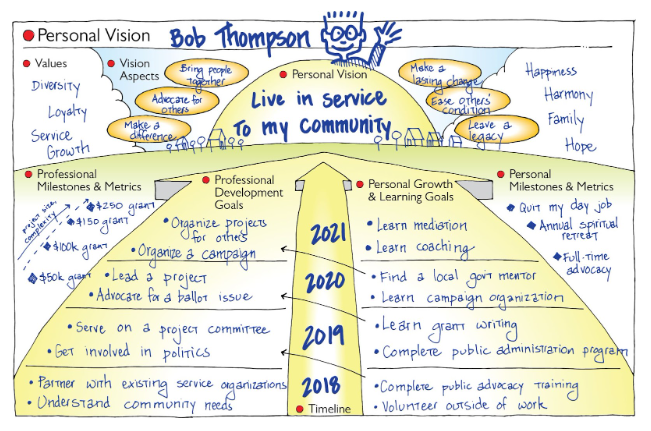Personal Visions: Creating High-Performing Teams with Shared Aspirations
Unless you have a deep admiration for the management philosophy of the Enron corporation, you’d probably agree that collaborative team environments are valuable assets in any organization. At Lizard Brain, we partner with organizations to intentionally design and develop high-performing teams and collaborative environments. We do this with the power of visual and experiential methods for effective group decision-making.
A key part of a collaborative team culture is ensuring that team members understand and support each other's visions and goals. It might seem that focusing on individuals’ dreams and aspirations runs against the purpose and mission of the team as a whole, but the best teams are made up of individuals whose individual interests align with and are served by the purpose and direction of the team. This congruence of individual and team purpose nurtures personal growth and propels organizational success.
To facilitate an understanding of individuals’ aspirations, we’ve developed a visual template that combines vision, values, and personal and professional goals. This tool is designed to help team members openly share their aspirations and align their efforts towards common objectives.
Personal Vision Template
Here’s how to complete your Personal Vision using this template:
1. Name values that motivate you.
Begin your journey by identifying the values that drive you. We recommend using the Kouzes and Posner deck of Values Cards as a starting point. Choose values that truly energize and motivate you. It might be hard to do so, but steer clear of those foundational “price of entry” values that you regard as basic necessities. Foundational values are important, but for this exercise, it’s more important to focus on the values that drive you and inspire you.
2. Write your personal vision statement.
With your values in hand, work on your Personal Vision statement. Your Personal Vision statement should be aspirational, starting with "to be" or another action-oriented phrase. This statement encapsulates your ultimate end state—what you aspire to become.
3. Define your visions’ aspects.
Vision Aspects are the building blocks of your Personal Vision. They answer the questions “What does the Personal Vision mean?” and “What would it look like if I achieved my vision?” Aspects help illustrate what achieving your Personal Vision would look like. Aspects provide clarity and detail to your overarching goals.
4. Set professional development and personal growth & learning goals:
Fill out your Professional Development Goals and Personal Growth & Learning Goals. Often, it’s easier to first outline your Professional Goals, then identify the Learning Goals necessary to achieve them. This dual focus ensures a balanced approach to both personal and professional development.
5. Establish milestones and metrics:
Finally, identify specific Milestones and Metrics for both personal and professional achievements. These are tangible measures of success that provide clear indicators of progress and accomplishment. They serve as checkpoints along your journey, ensuring you remain on track toward your aspirations.
When the Personal Vision templates are completed, encourage your team to share them. Team members shouldn’t just blast through the text as quickly as they can. Take time to ask questions, practice curiosity, go into dialogue, and most importantly, find opportunities to help each other achieve their Personal Visions.
By engaging in this process, team members better understand each other's dreams and ambitions. Managers can identify team members for work assignments and roles that better align with individuals’ goals. And team members become committed and engaged to a work environment that supports them.
At Lizard Brain, we believe that when teams align their visions and goals, they tap into the team’s core motivators and drivers. Embrace this approach and watch your team flourish as each member's unique vision contributes to the collective journey. Contact us today to learn how we can help your team.
Download the Personal Vision template here.

